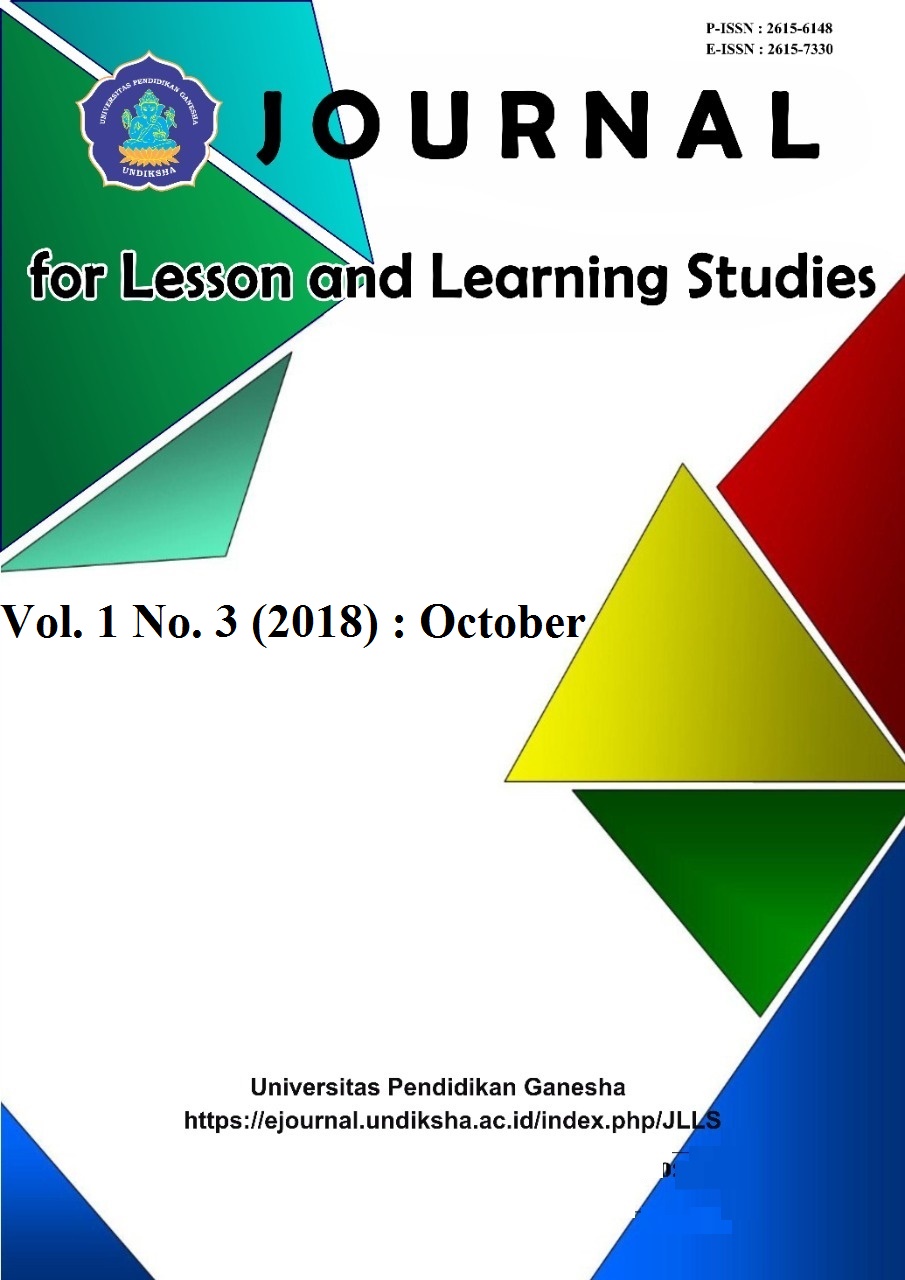PENGARUH PENDEKATAN SAINTIFIK BERBASIS PENILAIAN KINERJA TERHADAP PENGUASAAN KOMPETENSI PENGETAHUAN IPS DITINJAU DARI KEMAMPUAN BERPIKIR KREATIF
DOI:
https://doi.org/10.23887/jlls.v1i3.15373Abstrak
This study aims to (1) to know the significant difference of cognitive competence control of IPS among students who follow the learning with scientific approach based on performance appraisal and implementation of learning with scientific approach, (2) to know the significant difference of mastery of IPS cognitive competence among students who have ability high creative thinking and low creative thinking ability, (3) to know the interaction of learning implementation with scientific implementation based on performance appraisal and creative thinking ability to master IPS cognitive competence. The design of this research is Nonequivalent Control Group Design, using factorial design 2x2 Anava Dua Lane. Population in this study all students of class V SDN Ir. Soekarno Denpasar Selatan academic year 2015/2016. The data collected are data of creative thinking ability and IPS cognitive competence. The results of the study showed that (1) there was a significant difference of IPS learning outcomes between students who were educated through a scientific approach based on performance appraisal with groups of students who were taught by conventional scientific approach FAhitung = 4,94> F tabel(α = 0,05; 1,82)= 3,98), (2) there is no significant difference between mastery competence cognitive social class to the ability of creative thinking high and the capacity to think creative low students and the (FB =0,97 > F tabel(α = 0,05; 1,82)) = 3,98) , (3) there are the influence of an interaction between rendering based approach performance assessment and creative thinking learning of the results of the social class (FABhitung = 12,28 > F tabel(α = 0,05; 1,82)= 3,98).
Keywords: Performance Appraisal, Creative Thinking, IPS Cognitive Competence
Referensi
Admiyetti, Syamwil. 2016. Pengaruh Model Kooperatif Tipe Pair Check Berbasis Penilaian Kinerja dan Minat Siswa Terhadap Hasil Belajar Dalam Mata Pelajaran Akuntansi Kelas X SMKN 1 Lubuk Basung. E-journal Pendidikan Akuntansui UNP. Volume 2 nomor 1.
BSNP. 2011. Panduan Penyusunan Kurikulum Tingkat Satuan Pendidikan Dasar dan Menengah. Jakarta: BSNP.
Dayang Weni Lisdarsih. 2016. Pengaruh Model Pair Check Berbasis Penilaian Kinerja Terhadap Hasil Belajar Ilmu Pengetahuan Sosial Kelas IV. Jurnal Pendidikan dan Pengajaran UNTAN. Volume 5 Nomor 11.
Edy Setiyo Utomo. 2016. Pengaruh Model Pembelajaran Kooperatif Tipe Pair Check Berbasis Penilaian Kinerja Terhadap Hasil Belajar Siswa. Jurnal Pendidikan Matematika STKIP PGRI Jombang. Volume 1 Nomor 1.
Gunawan, Rudy. 2011. Pendidikan IPS Filosofi, Konsep, dan Aplikasi. Bandung: Alfabeta.
Hawadi, Reni Akbar dkk. 2010. Kreativitas. Jakarta : Pt Grasindo
Mita Puspita. 2014. Pengaruh Penerapan Pembelajaran Berbasis Penilaian Kinerja terhadap Hasil Belajar IPA Siswa Kelas V pada Gugus 7 Kecamatan Penebel Kabupaten Tabanan. Jurnal Mimbar PGSD Undiksha. Volume 2 nomor 1.
Putri Ayu Widiadnyani. 2014. Pengaruh Model Pembelajaran Pair Cheks Berbasis Penilaian Kinerja berbantuan Media Lingkungan Hidup terhadap Hasil Belajar IPA Kelas V SDN 5 Pedungan Tahun Ajaran 2013/2014. Jurnal Mimbar PGSD Undiksha. Volume 2 Nomor 1.
Susanto, Ahmad. 2014. Teori Belajar dan Pembelajaran.Jakarta : Kencana Prenamadia Group
Sugiyono, 2012. Metode Penelitian Pendidikan (Pendekatan Kuantitatif, Kualitatif dan R&D). Bandung: Alfabeta.
Sugiyono. 2013. Metode Penelitian Administrasi Dilengkapi Dengan Metode R&D. Bandung: Alfabeta
Suwarni hasibuan, hera deswita. 2017. Pengaruh Model Pembelajaran Pair Check Berbasis Penilaian Kinerja terhadap Hasil Belajar Matematika Siswa Kelas VIII SMP Negeri 2 Tambusai Kabupaten Rokan Hulu. Jurnal Pendidikan Matematika Universitas Pasir Pengaraian. Volume 3 Nomor 1.
Syah, Muhibbin. 2011. Psikologi Pendidikan. Bandung : Pt Remaja Rosdakarya
-------. 2014. Metode Penelitian Pendidikan (Pendekatan Kuantitatif, Kualitatif
dan R&D). Bandung: Alfabeta.
Widiadnyani, Luh Gd. Putri Ayu. 2014. “Pengaruh Model Pembelajaran Pair Check Berbasis Penilaian Kinerja Berbatuan Media Lingkungan Hidup Terhadap Hasil Belajar IPA Kelas V SDN 5 Pedungan Tahun Ajaran 2013/2014”. E-JournalPGSD Undiksha Mimbar PGSD Volume 2, No.1 (hlm. 1-10) (diakses pada 17 Januari 2018).
Yantiani, Ni Md. 2013. “Pembelajaran Kooperatif Pair Check Berbasis Penilaian Kinerja Berpengaruh Terhadap Hasil Belajar Materi Bangun Ruang dan Bangun Datar Siswa Kelas IV Gugus IV Semarapura”. E-Journal PGSD Undiksha Mimbar PGSD Volume 2, No.1 (hlm. 1-10) (diakses pada 17 Januari 2018).
Unduhan
Diterbitkan
Cara Mengutip
Terbitan
Bagian
Lisensi
Authors who publish with the Journal for Lesson and Learning Studies agree to the following terms:
- Authors retain copyright and grant the journal the right of first publication with the work simultaneously licensed under a Creative Commons Attribution License (CC BY-SA 4.0) that allows others to share the work with an acknowledgment of the work's authorship and initial publication in this journal.
- Authors are able to enter into separate, additional contractual arrangements for the non-exclusive distribution of the journal's published version of the work (e.g., post it to an institutional repository or publish it in a book), with an acknowledgment of its initial publication in this journal.
- Authors are permitted and encouraged to post their work online (e.g., in institutional repositories or on their website) prior to and during the submission process, as it can lead to productive exchanges, as well as earlier and greater citation of published work. (See The Effect of Open Access)




